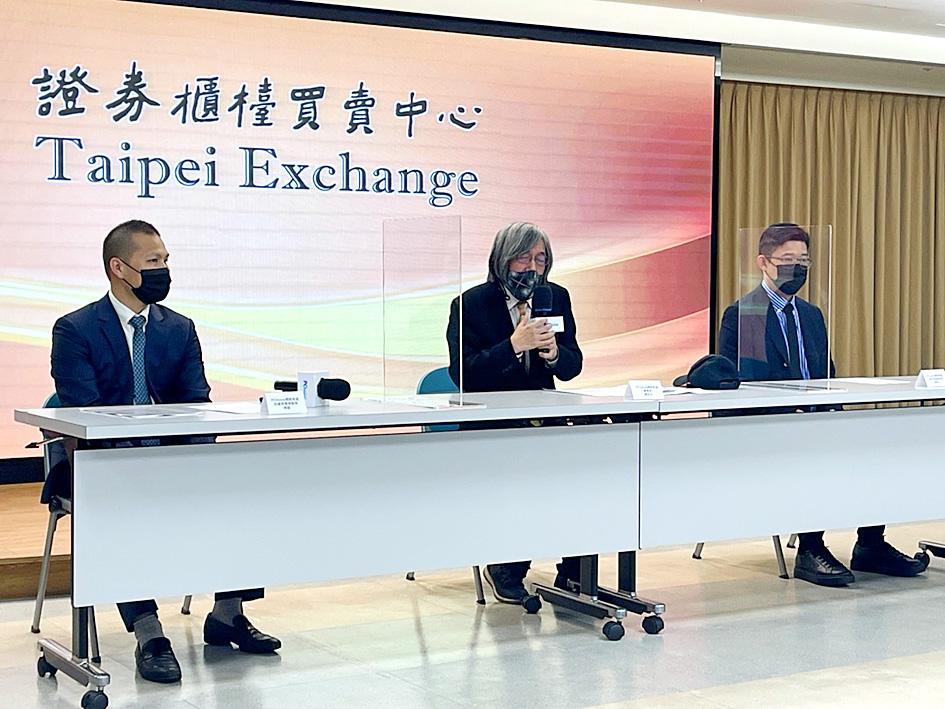PChome Online Inc (網路家庭) is planning a private placement to seek strategic investors for its long-term development and collaboration across sectors, the e-commerce company said at a news conference at the Taipei Exchange on Friday.
The company plans to raise NT$1 billion (US$36.05 million) from China Development Financial Holding Corp (中華開發金控), Chunghwa Telecom Co (中華電信) and the management team of 21st Century Digital Technology Co (廿一世紀數位), it said after gaining approval from its board of directors earlier that day.
Private placement refers to the sale of a large tranche of securities to a small group of investors. In such a transaction, buyers sign an investment letter stating that the securities would not be resold for a specified period of time.

Photo: CNA
In PChome’s case, the sale of 9,376,463 common shares — at NT$106.65 per share — to the three strategic investors accounts for 7.35 percent of its outstanding shares, it said.
“By leveraging the experiences and resources on financial services and valuable telecom big data, as well as its AI-enablement technology from the strategic investors, PChome anticipates to accelerate the data-driven digital transformation to not only reinforce its fintech ecosystems, specifically on e-commerce and fintech solutions, but also optimize its fintech subsidiary organization through this strategic partnership,” the company said in a statement.
To integrate resources and promote cooperation to enhance shareholders’ interests, PChome said its board also approved a plan to obtain about 50 percent of the shares in 21st Century Digital.
Based on their agreement, PChome plans to invest about NT$2.16 billion and exchange shares of its mobile payment arm Pi Mobile Technology Inc (拍付國際) to secure about 10.28 million common shares of 21st Century Digital, while 21st Century Digital is to acquire 34.49 million common shares of Pi Mobile through share swap.
One share of Pi Mobile is worth 0.298 common shares of 21st Century Digital, PChome said.
21st Century Digital is a service provider in the digital consumer fintech field. It mainly provides “buy now pay later” (BNPL) services, including installment payments and mortgage loans through their own online platform, offline channels and e-commerce Web site.
The company was established in 2016 with a capitalization of NT$380 million. Last year, it obtained investment from CDIB Venture Capital Corp (中華開發創業投資) to develop a long-term partnership with a subsidiary of China Development Financial Holding. This year, the company’s BNPL service, Gogopay (分期趣), officially launched on PChome’s platform.
The investment in 21st Century is to occur after the completion of the private placement, PChome said.

SETBACK: Apple’s India iPhone push has been disrupted after Foxconn recalled hundreds of Chinese engineers, amid Beijing’s attempts to curb tech transfers Apple Inc assembly partner Hon Hai Precision Industry Co (鴻海精密), also known internationally as Foxconn Technology Group (富士康科技集團), has recalled about 300 Chinese engineers from a factory in India, the latest setback for the iPhone maker’s push to rapidly expand in the country. The extraction of Chinese workers from the factory of Yuzhan Technology (India) Private Ltd, a Hon Hai component unit, in southern Tamil Nadu state, is the second such move in a few months. The company has started flying in Taiwanese engineers to replace staff leaving, people familiar with the matter said, asking not to be named, as the

The prices of gasoline and diesel at domestic fuel stations are to rise NT$0.1 and NT$0.4 per liter this week respectively, after international crude oil prices rose last week, CPC Corp, Taiwan (台灣中油) and Formosa Petrochemical Corp (台塑石化) announced yesterday. Effective today, gasoline prices at CPC and Formosa stations are to rise to NT$27.3, NT$28.8 and NT$30.8 per liter for 92, 95 and 98-octane unleaded gasoline respectively, the companies said in separate statements. The price of premium diesel is to rise to NT$26.2 per liter at CPC stations and NT$26 at Formosa pumps, they said. The announcements came after international crude oil prices

DOLLAR SIGNS: The central bank rejected claims that the NT dollar had appreciated 10 percentage points more than the yen or the won against the greenback The New Taiwan dollar yesterday fell for a sixth day to its weakest level in three months, driven by equity-related outflows and reactions to an economics official’s exchange rate remarks. The NT dollar slid NT$0.197, or 0.65 percent, to close at NT$30.505 per US dollar, central bank data showed. The local currency has depreciated 1.97 percent so far this month, ranking as the weakest performer among Asian currencies. Dealers attributed the retreat to foreign investors wiring capital gains and dividends abroad after taking profit in local shares. They also pointed to reports that Washington might consider taking equity stakes in chipmakers, including Taiwan Semiconductor

A German company is putting used electric vehicle batteries to new use by stacking them into fridge-size units that homes and businesses can use to store their excess solar and wind energy. This week, the company Voltfang — which means “catching volts” — opened its first industrial site in Aachen, Germany, near the Belgian and Dutch borders. With about 100 staff, Voltfang says it is the biggest facility of its kind in Europe in the budding sector of refurbishing lithium-ion batteries. Its CEO David Oudsandji hopes it would help Europe’s biggest economy ween itself off fossil fuels and increasingly rely on climate-friendly renewables. While